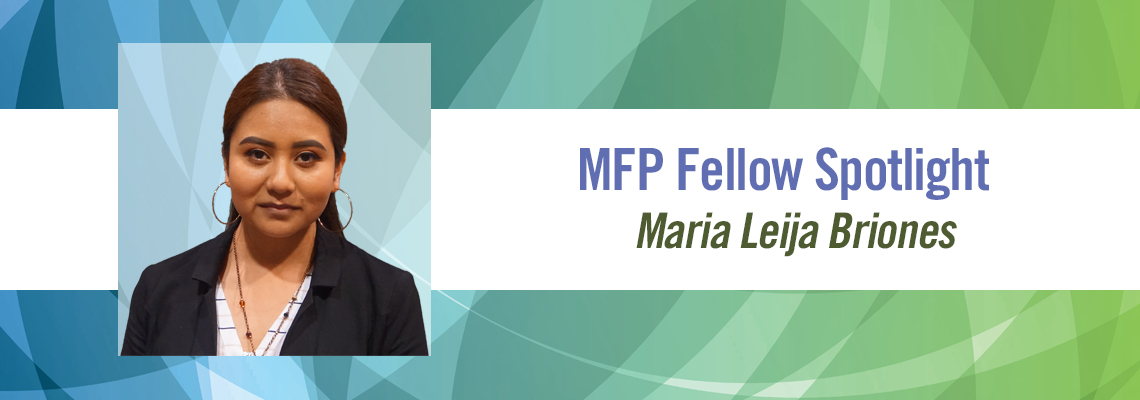
Foundation Connections

Minority Fellow Overcomes Obstacles and Hopes to Do the Same for Others
Published 8/13/2019
Overcoming adversity has been a theme for Maria Leija Briones.
After all, the 2019 NBCC Foundation Minority Fellow—a 30-year-old, first-generation master’s student entering her second year of counseling study at Lewis & Clark College in Portland, Oregon—came to the U.S. at age 15, leaving behind her parents in a small town outside San Luis Potosi in central Mexico.
She didn’t speak English, and though initially overwhelmed by the language and cultural barriers as she entered 10th grade in Hillsboro, Oregon, by her second day she’d made friends with another Latino student, which helped. A bilingual counselor at the school provided assistance, too. For months, Briones stayed two hours a day after school for a homework class to learn English and be the student with a future she’d dreamed of when she left Mexico. Her efforts and dedication allowed her to thrive.
But negativity has a way of taking root. When a teacher suggested during her senior year that her broken English might not make her a good candidate for college, Briones had to again face her fears. A counselor who became her mentor encouraged and assisted in finding scholarships, which were difficult tasks for a first-generation student learning to navigate the American educational system. Briones was accepted into Portland State University. It took her five years, but she obtained her bachelor’s degree, majoring in psychology and minoring in Spanish.
It was at Portland State where Briones found her career direction. As soon as she began a counseling class, she realized how much more she enjoyed it than the more science-oriented psychology courses.
“Having empathy for my client, I enjoyed that more than just learning about the brain,” she says. “I know it’s all related, but in my counseling class, it was mostly about people and how to understand them, how to reason with them.”
Once she graduated, Briones entered the workforce, putting her bilingual skills to use. She was a counselor at a residential treatment program for commercially sexually exploited children, providing support and guidance to help them with daily living; she worked with youths referred to a Peer Court diversion program; and she conducted alcohol and drug screenings, as well as risk and diagnostic assessments for a non-profit agency in Portland that provided early intervention and outpatient treatment. She also gained experience working in a juvenile justice setting as a bilingual juvenile counselor.
Briones understood and connected with many of the youths and family members she worked with. She, too, had seen her share of family strife because of addictions, cultural difficulties in a new land, and simply believing she wasn’t good enough to achieve.
“I feel like speaking their own language was just a big relief for them,” she says. “I remember seeing them happy when I introduced myself in Spanish and helping them in Spanish. They were more open with me. Having someone who you can relate to, I think, is very helpful for these families.”
Still, Briones knew she wanted to work more directly in a counseling role. She also knew she wanted to explore more in addictions work. She was accepted into Lewis & Clark’s master’s program, where she is pursing a specialization in addictions.
She’s particularly interested in dual diagnosis clients, knowing that many in the Latino population—she especially hopes to work with youths—face alcohol or drug problems, as well as other addictions such as gambling, and mental health conditions.
Many in that population do not have access to private practice counselors, so Briones would like to work for a non-profit, such as the agency where she is currently working as a graduate assistant, Latino Problem Gambling Services in Portland. Problem gambling is a hidden problem in the Latino community, she notes.
“Many don’t know they have an addiction until they’re in big debt. They’re spending their whole paycheck and don’t have money to pay the rent,” she says. “Or there are family problems because the person with the problem is not around. And it can affect everyone’s health when there’s no money left from gambling.”
Briones speaks with a confidence about such issues even though she acknowledges she is still working to believe in herself.
“As a woman of color, I constantly receive messages that I am not good enough,” she says. “I believe people of color always have to work twice as hard to be able to prove ourselves, to prove we are enough. But this is not how it should be. We are enough.”
She credits her acceptance as an NBCC Minority Fellow with improving her self-image. In addition to the financial support she receives as a Fellow, the mentorship and peers she has and will continue to meet—as well as the conferences she will attend—will only enhance her knowledge.
“I feel like I am finding my voice and that I can speak out,” Briones says, “and that there is nothing wrong with speaking up and being able to say how I am feeling.”
Briones eventually would like to seek a PhD and work with underserved communities. She sees a huge need, especially given the country’s political divisiveness around immigration.
“My community is experiencing so much trauma,” she says, “and I want to be there to help them in their healing process.”
“I want to work with them because of this knowledge that people are feeling, right now, oppression and racism,” she says. “I’d like to help people identify what is happening to them so they don’t feel something is wrong with them. The system is to blame.”

